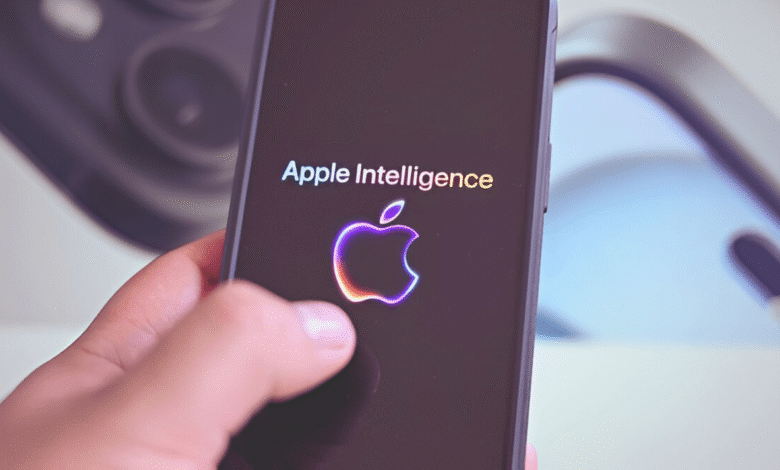Apple Intelligence Explained: Everything About Apple’s New AI in iOS 18
Apple Intelligence in iOS 18 revolutionizes your iPhone with advanced on-device AI, smarter Siri, and privacy-focused machine learning.

Apple Intelligence is set to revolutionize the iPhone experience with its deep integration into iOS 18, marking Apple’s most ambitious leap into artificial intelligence yet. This groundbreaking AI system combines advanced machine learning with Apple’s signature emphasis on privacy and on-device processing, delivering smarter, faster, and more personalized interactions. From a supercharged Siri to intelligent photo enhancements and predictive text, Apple Intelligence transforms how users engage with their devices all while keeping data secure and responsive without heavy reliance on the cloud.
Unlike traditional AI models that depend on external servers, Apple Intelligence leverages the powerful Neural Engine in Apple’s chips to process data locally, ensuring real-time performance and unmatched security. Whether it’s suggesting quick replies, optimizing battery life, or enhancing camera capabilities, this system learns user habits seamlessly while maintaining strict privacy controls. As iOS 18 prepares to launch, Apple Intelligence positions itself as a game-changer, blending cutting-edge AI with the intuitive, user-friendly experience Apple is known for.
Apple Intelligence Explained
What Is Apple Intelligence?
Apple Intelligence is Apple’s next-generation AI framework embedded into iOS 18, designed to enhance user interactions through machine learning and neural engine optimizations. Unlike traditional AI models that depend on cloud servers, Apple’s system leverages the powerful A-series and M-series chips to process data directly on the device. This ensures faster responses, improved privacy, and offline functionality. The core philosophy behind Apple Intelligence is to make technology more adaptive and personalized. By analyzing user habits, app usage, and even typing patterns, the system can predict needs before they arise.
Key Features of Apple Intelligence in iOS 18
Siri Gets Smarter
One of the most noticeable upgrades in iOS 18 is the enhanced Siri. Powered by Apple Intelligence, Siri now understands natural language better, supports contextual conversations, and performs complex tasks like summarizing emails or drafting messages. The improved voice recognition ensures fewer errors, making interactions smoother.
Advanced Photo and Video Enhancements
The Photos app now uses AI-driven algorithms to enhance images automatically. Features like smart cropping, noise reduction, and portrait lighting adjustments are more precise. Additionally, video editing becomes easier with auto-generated captions and scene detection.
Predictive Text and Writing Tools
With Apple Intelligence, the keyboard learns from your writing style, offering predictive text that feels more natural. New AI-powered writing assistants can help rephrase sentences, correct grammar, and even generate content summaries.
On-Device Privacy
Unlike competitors, Apple processes most AI tasks locally, reducing reliance on cloud servers. This means sensitive data such as messages, emails, and browsing history—stays secure. Only select features requiring broader data access use secure encrypted cloud processing.
Personalized App Experiences
Apps like Calendar, Reminders, and Maps now use AI to provide tailored suggestions. For instance, Maps can predict your destination based on routine, while Calendar auto-schedules events by analyzing your habits.
How Apple Intelligence Differs from Other AI Systems
While Google’s Gemini and OpenAI’s ChatGPT rely on massive cloud-based models, Apple Intelligence emphasizes on-device processing. This not only enhances speed but also strengthens data security. Another key difference is integration Apple’s AI works seamlessly across all native apps, creating a unified experience rather than standalone functions. Moreover, Apple avoids the “data-hungry” approach seen in other AI systems. Instead of collecting vast amounts of user information, it focuses on differential privacy, ensuring that learning happens without exposing personal details.
The Technology Behind Apple Intelligence
At the heart of Apple Intelligence lies the Neural Engine, a dedicated processor within Apple’s chips designed for machine learning tasks. The A18 and M4 chips further boost performance, enabling real-time AI computations. Additionally, Core ML (Apple’s machine learning framework) allows developers to integrate AI features into third-party apps efficiently. Another critical component is Transformers, the architecture behind advanced language models. Apple has optimized this technology to run efficiently on iPhones and iPads, ensuring smooth performance even with complex tasks like real-time translation and voice synthesis.
Privacy and Security Considerations
Apple has always prioritized user privacy, and Apple Intelligence is no exception. Most data processing occurs on-device, with only anonymized, encrypted information sent to servers when necessary. Features like Private Cloud Computing ensure that even cloud-based tasks are handled securely without storing personal data. The company also implements differential privacy techniques, meaning the AI learns from aggregated data patterns rather than individual inputs. This prevents personal information from being exposed, setting Apple apart from other tech giants.
Future Prospects of Apple Intelligence
Deeper Ecosystem Integration
Apple Intelligence is expected to expand beyond iOS 18, seamlessly connecting with macOS, watchOS, and visionOS for a unified AI experience across all Apple devices. Imagine starting a task on your iPhone and having your MacBook or Apple Watch automatically continue it with contextual awareness. Cross-device synchronization could enable smarter automation, like adjusting your HomeKit settings based on your location across multiple gadgets.
Advanced Augmented Reality (AR) Enhancements
With Apple’s growing focus on AR and Vision Pro, Apple Intelligence could power real-time object recognition, spatial computing, and immersive AI-assisted navigation. Future updates might introduce AI-generated 3D environments or virtual assistants that interact with physical spaces, revolutionizing gaming, education, and professional workflows.
Proactive Health and Wellness Monitoring
Leveraging data from the Apple Watch and other sensors, Apple Intelligence could evolve into a predictive health assistant, detecting early signs of medical issues like irregular heart rhythms or sleep disorders. Integration with HealthKit might provide personalized fitness recommendations, mental health insights, and even emergency alerts based on biometric data trends.
Smarter Home and Automotive Automation
As Apple expands into smart home and Apple Car ecosystems, Apple Intelligence could become the brain behind fully automated environments. Your iPhone might learn your daily routines to adjust lighting, temperature, or even driving routes autonomously. Deeper Siri integration with HomePod and CarPlay could enable voice-controlled, AI-optimized living and transportation.
Development of Apple’s Own Large Language Models (LLMs)
Rumors suggest Apple is developing proprietary LLMs to compete with ChatGPT and Gemini. Future versions of Apple Intelligence might feature advanced conversational AI capable of complex reasoning, creative content generation, and hyper-personalized assistance all processed securely on-device to maintain privacy.
Read More: Tackle These 7 Hidden Costs of Software Development & Save 3x of Your Money Now!
Conclusion
Apple Intelligence represents a transformative leap in mobile AI, seamlessly blending cutting-edge machine learning with Apple’s unwavering commitment to user privacy in iOS 18. By harnessing the power of on-device processing through the Neural Engine, this revolutionary system delivers smarter Siri interactions, more intuitive photo editing, and predictive assistance that feels genuinely personalized – all while keeping sensitive data secure. The integration of Apple Intelligence across native apps creates a cohesive ecosystem where your iPhone doesn’t just respond to commands, but anticipates needs and adapts to your unique usage patterns.
As we look toward the future of mobile technology, Apple Intelligence in iOS 18 sets a new standard for what artificial intelligence can achieve without compromising security or performance. This isn’t just another AI assistant – it’s a fundamental reimagining of how our devices understand and assist us in daily life. With its combination of powerful local processing, privacy-first architecture, and deeply integrated features, Apple Intelligence promises to make the iPhone experience more intuitive, efficient, and personalized than ever before, solidifying Apple’s position at the forefront of consumer AI innovation.
What is Apple Intelligence?
Apple Intelligence is Apple’s new AI system in iOS 18, enhancing Siri, photo editing, predictive text, and more with on-device machine learning.
How does Apple Intelligence protect privacy?
It processes most data locally, using differential privacy and secure cloud computing only when necessary.
Will Apple Intelligence work offline?
Yes, many features operate offline thanks to the Neural Engine in Apple’s chips.
How is Siri improved with Apple Intelligence?
Siri now understands contextual conversations, offers summaries, and performs complex tasks with better voice recognition.
When will iOS 18 with Apple Intelligence be released?
The official release is expected in Fall 2024, following a developer beta in June.










